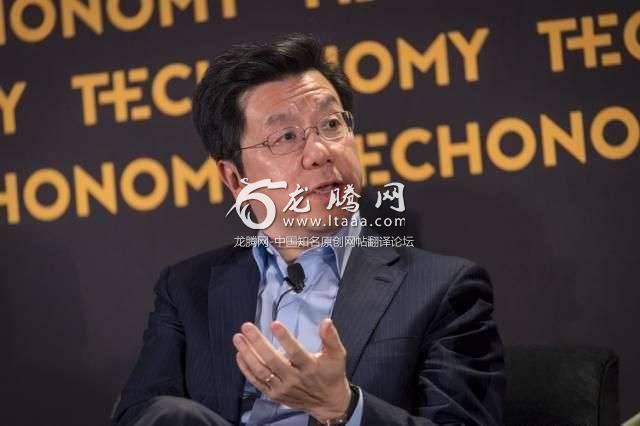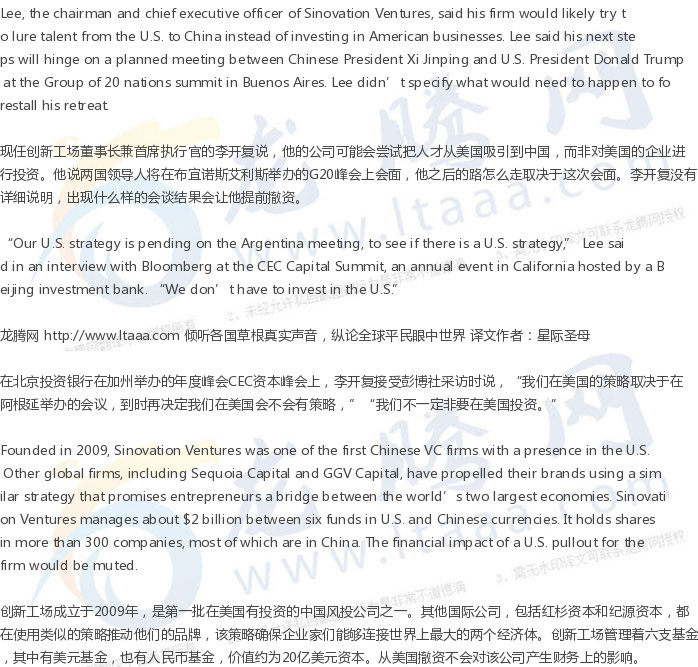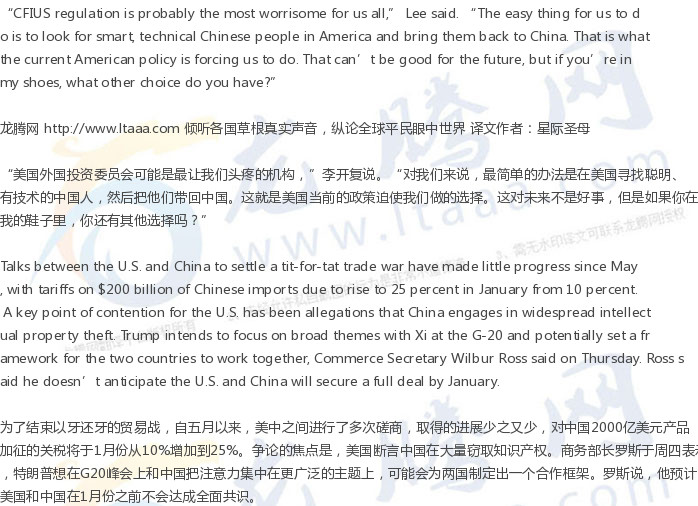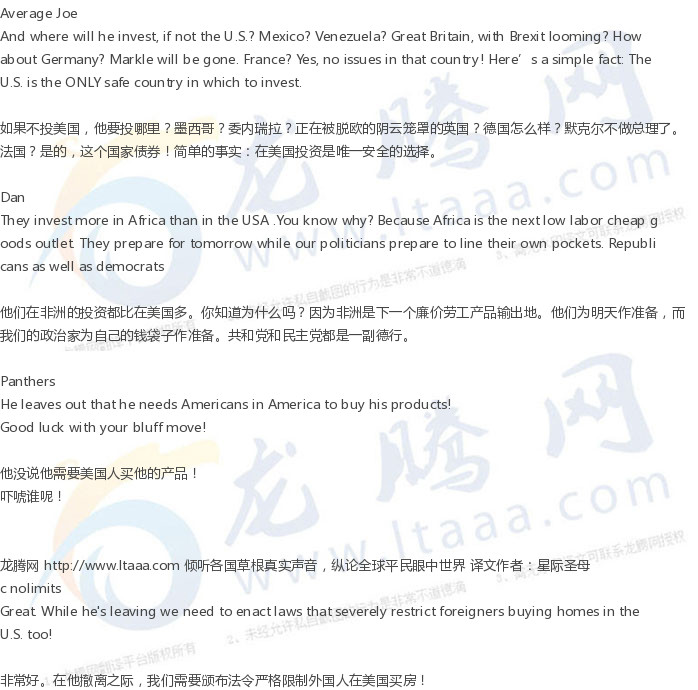一家顶尖中国风投公司威胁说将缩减在美国的投资 [美国媒体]
李开复是一位著名的中国风险投资人,也是谷歌中国前总裁。他说,如果中美两国关系继续恶化,他的投资公司可能会按比例缩减在美国的投资。
(Bloomberg) -- Kai-Fu Lee, a prominent Chinese venture capitalist and former president of Google China, said his investment firm may scale back in the U.S. if relations between the two countries deteriorate further.
李开复是一位着名的中国风险投资人,也是谷歌中国前总裁。他说,如果中美两国关系继续恶化,他的投资公司可能会按比例缩减在美国的投资。
“Ninety-five percent of our past money was invested in China, so that could easily be 98 percent or 100 percent if that’s what it takes,” Lee said. “We may end up with two internets. We may end up with two sets of AI. We may end up with two sets of internet governance principles.”
李开复说,“我们95%的资金都投在了中国,所以如果有必要的话,我们可以轻松地把这个数字提高到98%或100%,”“最终,世界上可能会有两套互联网、两种人工智能、两套互联网行业标准。”
Lee’s uneasiness reflects a common feeling among Chinese-rooted investors doing business in the U.S. The Trump administration has blocked or delayed deals, large and small, between U.S. and Chinese tech companies. In the first five months of the year, Chinese acquisitions and investments fell to the lowest level in seven years, a drop of 92 percent, according to Rhodium Group, a global economic and policy research firm.
李开复的担忧反应了在美国做生意但根植于中国的投资者们的共同感受。特朗普政府终止或延迟了美中科技公司之间的所有业务往来。据一家研究全球经济和政策的公司荣鼎咨询公司称,今年前五个月,中国公司的并购和投资跌到了七年来的最低水平,跌了92%。
In August, Congress gave the Treasury Department the authority to strengthen the Committee on Foreign Investment in the U.S., or CFIUS, an inter-agency panel that reviews cross-border business transactions for national security risks. Under new rules, even a small investment can be flagged for CFIUS review.
8月,国会给了财政部强化美国外国投资委员会的权力,该委员会是一个跨部门的小组,他们的工作是审查跨境交易给国家安全带来的风险。在新的规则下,即使是小投资也要被审查。
Lee said his initial goal for Sinovation Ventures in the U.S. was to help companies there reach Chinese consumers and then the rest of the world. His investments in the U.S. focus on robotics, artificial intelligence and education technology, with stakes in startups that make autonomous delivery robots, energy data collection tools and AI to improve factory production.
李开复说,创新工场原本计划在美国帮助美国公司接触中国消费者,然后再推向世界。他在美国的投资集中在机器人、人工智能和教育科技上,押注了开发自动送货机器人,以及改善工厂生产的能源数据收集器和人工智能的初创公司。
“If our founders were half American and half Chinese, if our money was half American and half Chinese, then both countries gain,” Lee said. “It should be doable, but the current trade dispute seems to make that an impossibility. So, we are actually on the path to increasingly separate the two parallel universes.”
“如果我们的创办人一半是美国人,一半是中国人,如果我们的资本一半来自美国,一半来自中国,那对两国都有益,”李开复说。“这是可行的,但是现在的贸易争端好像让此事变得不可能。所以,我们实际上正在渐渐分离出两个平行宇宙。”
Ken
We encourage you not to invest here. It'll make it harder for you to steal our technology..
我们鼓励你别来投资。这会让你更难窃取我们的技术....
sunbeam
That is very good news - we don’t want Chinese investments in the US. We know for a fact that these investments are a back Door for technological transfers back to China. The more Chinese investments are out, the better. We should only accept investments from countries with democratic governments and the rule of law. We do not want investments from shady countries anyway. Japan is welcome to invest, Singapore is welcomed, India is welcomed
这是个好消息,我们不希望中国人在美国投资。我们知道,这些投资其实是为把技术转移到中国而开的后门。越多中国投资撤离美国越好。我们应该只接受来自民主和法治国家的投资。反正我们又不想要中国的投资。我们欢迎日本投资、新加坡投资、印度投资。
factswelcome
Good move. Nurture domestic talents. Technology self reliance is the name of the game for China. Alternatively, invest in Canadian talents. Most of the Canadian talents are forced to serve America because of lack of funds at home.
这一步走得好。培养国内人才。对中国来说,技术自主是最重要的。可以选择投资加拿大。大部分加拿大人才被迫为美国服务,因为国内缺乏资金。
版权声明
我们致力于传递世界各地老百姓最真实、最直接、最详尽的对中国的看法
【版权与免责声明】如发现内容存在版权问题,烦请提供相关信息发邮件,
我们将及时沟通与处理。本站内容除非来源注明五毛网,否则均为网友转载,涉及言论、版权与本站无关。
本文仅代表作者观点,不代表本站立场。
本文来自网络,如有侵权及时联系本网站。
阅读:
图文文章RECOMMEND
热门文章HOT NEWS
-
1
Why do most people who have a positive view of China have been to ...
- 2
- 3
- 4
- 5
- 6
- 7
- 8
- 9
- 10
推荐文章HOT NEWS
-
1
Why do most people who have a positive view of China have been to ...
- 2
- 3
- 4
- 5
- 6
- 7
- 8
- 9
- 10














